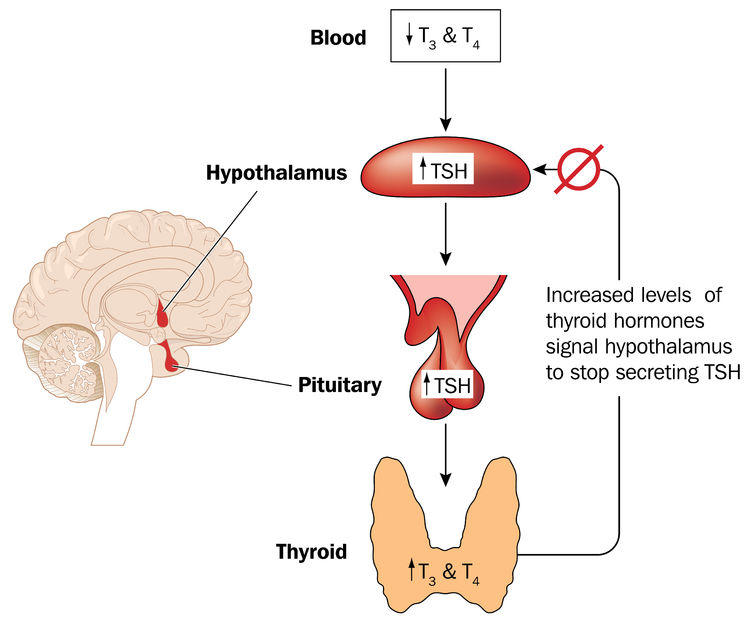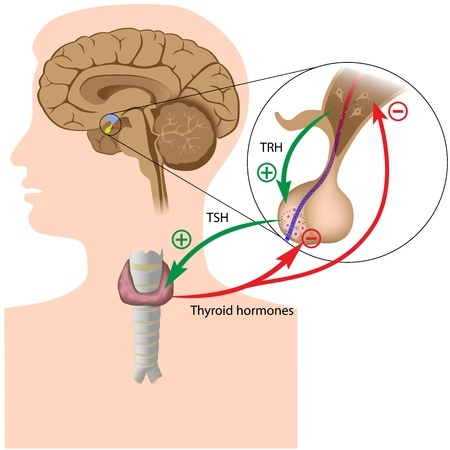
Table of Contents
Last Updated on
The thyroid is a small, butterfly-shaped gland which produces hormones that travel through the blood to all parts of your body, where they do their work. Hormones produced by thyroid help all organs in your body function properly. For instance, they control how the body uses food for energy. One important aspect of thyroid’s functionality is a feedback loop and this post will inform you more about this subject.
What is a feedback loop?
Feedback loops refer to the manner that the nervous system guides the endocrine system to control body conditions. More precisely, feedback mechanisms are responses that trigger other processes and activities. Your endocrine system controls various bodily functions including sexual development, reproduction, growth, and maintenance, metabolism, respond to external stimuli.
Regardless of the function it controls, the endocrine system follows the same pattern that includes receiving a signal, hormonal response, and reaction. Feedback loops regulate a vast majority of endocrine activities. Basically, feedback loops function like a thermostat which responds to the changes in temperature and informs the “furnace” when to switch on/off.
In humans, the hypothalamus acts like a thermostat of feedback systems and the endocrine glands act like the air conditioner or a heater. Hormones are either released or stop being produced in response to the messages sent by the hypothalamus.
Feedback loops can be divided into two types: positive and negative. Positive feedback loops are defined as amplifications away from a target level while negative feedback mechanisms attempt to maintain a target level. The latter are the most common.
Don’t let the name fool; negative feedback loop is a good thing when it comes to homeostasis. On the other hand, the body doesn’t utilize positive feedback loop due to the fact it doesn’t like extreme conditions. Bearing in mind that negative feedback mechanisms maintain adequate conditions in your body, it is more prevalent than its counterpart. Positive feedback loop refers to the greater stimulation a gland receives. As a result, more hormone is produced.
Thyroid feedback loop
 In order to understand how thyroid functions one has to know more about the thyrotropic feedback control. The thyrotropic feedback control is defined as a feedback mechanism that connects thyroid gland and pituitary. Why? That’s because the thyroid gland is controlled by the pituitary, a gland about the size of a pea, located at the base of the brain. Therefore, this particular feedback loop has a unique purpose to regulate or control the amount of thyroid hormones present in blood plasma.
In order to understand how thyroid functions one has to know more about the thyrotropic feedback control. The thyrotropic feedback control is defined as a feedback mechanism that connects thyroid gland and pituitary. Why? That’s because the thyroid gland is controlled by the pituitary, a gland about the size of a pea, located at the base of the brain. Therefore, this particular feedback loop has a unique purpose to regulate or control the amount of thyroid hormones present in blood plasma.
The evidence shows that production of thyroid hormone is controlled by a complicated mechanism of positive and negative regulation i.e. feedback mechanisms. Your pituitary gland secretes the gonadotropic hormone called thyrotropin (TSH) which promotes secretion of T4 (thyroxine) and T3 (triiodothyronine) in the thyroid gland.
At the same time, thyroid hormones inhibit the secretion of TSH in the form of negative feedback to establish a balance between the involved hormones. The feedback interaction is contributed by complementary feedback loops:
- Long-feedback loop – connects thyroid hormones with TRH (releasing hormone) secretion
- Ultra-short feedback loop – TSH inhibits its own secretion
- Feedback loops for plasma protein binding of T3 and T4
According to a study whose findings were published in the journal Cybernetics and Systems, ultra-short feedback loop along with stochastic stimulation are involved in the generation of TSH pulses in the pituitary.
Functional states of thyroid feedback loop
The thyroid feedback loop has different functional states including euthyroidism, hypothyroidism, hyperthyroidism.
Euthyroidism
Euthyroidism refers to the normal state with regular function of the thyroid gland as well as closed and functional thyrotropic feedback control. Although this is a normal condition or functioning of the thyroid gland, it is poorly studied particularly because research is primarily navigated towards hyper- and hypothyroidism.
A study whose findings were published in the journal Thyroid evaluated the progression in time from euthyroidism to hypo- or hyperthyroidism and made interesting discoveries. Results showed that about 6.7% of euthyroid participants experienced a dysfunction of the thyroid gland, especially hypothyroidism, after a six-year follow-up.
Hypothyroidism
Hypothyroidism is a condition that indicates the thyroid gland is underactive. Basically, it means this gland can’t produce sufficient amount of thyroid hormone to keep the body functioning normally.
Prevalence
Hypothyroidism is more prevalent in women and according to some estimates, it has a total prevalence of 1% to 2% and it increases with age. In the United States, the prevalence of biochemical hypothyroidism is 4.6%. It is important to mention that congenital hypothyroidism is one of the most common congenital diseases and it affects 1 in 4000 newborns.
Types of hypothyroidism
What most people don’t know is that there are different types of hypothyroidism:
- Primary – feedback control is disconnected in the thyroid gland e.g. autoimmune thyroiditis, after a thyroid surgery, or due to low secretion capacity
- Secondary – feedback control is disconnected in the pituitary gland e.g. anterior pituitary insufficiency
- Tertiary – missed set point due to the lack of TRH e.g. non-thyroidal illness syndrome, Pickardt syndrome, hypothalamic damage
Hypothyroidism risk factors
Despite the fact that everyone can develop hypothyroidism, some people have a higher risk. For example:
- Women older than 60
- Women who were pregnant and delivered a baby within the past 6 months
- Individuals who suffer from an autoimmune disease
- Patients who underwent thyroid surgery
- People with a family history of thyroid disease
- Patients who received radiation to neck and chest
- Individuals who were treated with radioactive iodine or anti-thyroid medications
Symptoms of hypothyroidism
Symptoms of hypothyroidism vary based on the severity of hormone deficiency. Signs of this condition don’t occur overnight, they develop slowly. The very first symptoms such as fatigue and weight gain usually go unnoticed, but as the metabolism continues to slow down other, more obvious symptoms appear. The most common signs and symptoms of hypothyroidism include:
- Constipation
- Depression
- Dry skin
- Elevated blood cholesterol levels
- Fatigue
- Hoarseness
- Impaired memory
- Increased sensitivity to cold
- Irregular menstrual periods, or heavier than normal
- Muscle ache and tenderness
- Pain, swelling, stiffness in joints
- Puffy face
- Slowed heart rate
- Thinning hair
- Weight gain
Hyperthyroidism
Hyperthyroidism refers to the state of overactive thyroid i.e. the gland produces excessive amounts of the hormone thyroxine.
Types of hyperthyroidism
We can divide hyperthyroidism into two categories:
- Primary hyperthyroidism – abnormal secretion of thyroid hormones in certain thyroid diseases such as Graves’ disease, toxic adenoma
- Secondary hyperthyroidism – by TSH-producing tumors of pituitary
Risk factors
Just like hypothyroidism, the hyperthyroidism is more common in women than in women. The condition tends to run in families, which is why people with a history of hyperthyroidism in the family should consult a healthcare provider. Your physician will inform you what it means for your health, he or she may also recommend monitoring of thyroid function.
Symptoms of hyperthyroidism
It can be difficult to diagnose hyperthyroidism because it can mimic symptoms of other conditions. Signs and symptoms of this health issue include:
- Brittle hair
- Changes in bowel pattern
- Changes in menstrual pattern
- Difficulty sleeping
- Enlarged thyroid gland
- Fatigue
- Increased appetite
- Increased sensitivity to heat
- Muscle weakness
- Nervousness, anxiety, and irritability
- Rapid heartbeat
- Sudden weight loss
- Sweating
- Thinning of your skin
- Tremor (fine trembling in hands and fingers)
Thyrotoxicosis
Thyrotoxicosis refers to the excessive level of thyroid hormone in the body. A person with this condition also has a low level of thyroid stimulating hormone (TSH) in the bloodstream. This happens because the pituitary gland assumes you have enough thyroid hormone. Since the bodily functions speed up with thyrotoxicosis, it is not uncommon for individuals with this condition to experience mood swings and irritability.
The most common cause of thyrotoxicosis is hyperthyroidism, but it can also occur due to the inflammation of the gland (thyroiditis) or due to taking thyroid medications.
Conclusion
Feedback loops are the essential component of most control mechanisms in physiology, particularly in the endocrine system, and thyroid hormones aren’t the exception. Although cases of positive feedback can occur, a negative feedback loop is widely prevalent. When it comes to the thyroid gland, the feedback loop is associated with the relationship with pituitary, which controls the thyroid and its hormones. This feedback loop has different functional states including normal (euthyroidism) to more well-known conditions such as hyper- and hypothyroidism. However, there is still a lot we don’t know about thyroid feedback loop, which is why it is necessary to do more research on this subject.

Ever since they used radioactive iodine (18years ago)to stop my thyroid from being hyperthroidism do to (Graves disease) I have been out of wack. I went from being thin, active, very social, played sports, to gaining 60lbs, losing my hair depression, anxiety, every hypothroidism problem there is to have and then some. My meds for my graves disease in the last 12 to 15 yrs has only been levothyroxine 150 mcg to 175mcg the only go by TSH reading as long as my reading is between those 2 lines they dont change my meds. They treat all the problems with other drugs. Blood pressure meds,pain meds, swelling meds, depression meds etc. My last blood test TSH 25.33 my doctor accused me of not taking my meds. They got me so stressed. Now they wanted me to start diabetic meds, my CHOL 270. The last 3 years have been bad all around. These doctors are going to kill me HELP PLEASE.
Have you gone to a 2nd endocrinologist for another opinion? You are paying for professional services, if you are unhappy with the services rendered, hire somebody else. If you are unhappy with your Dr, leave them. You are in control, not them. It’s not different than hiring a plumber or a lawyer. Work with the person you trust most and does the best job.
You may want to try a different form of thyroid meds, like Tirosint, which is a higher bioactive gelcap form of levothyroxine which is better absorbed by the body, or one of the alternatives to levothyroxine. Excess meds could be causing all sorts of side effects, you need decide what is essential and what is not.
Be pro-active to get results. Wishing you the best of luck. You’ll get there, just keep on pushing. Drs expect patients to settle. Don’t settle.
comprehensive article. Can you tell me if spreading iodine on my skin will help my under active thyroid?
Topical applications of Iodine would definitely help raise Iodine levels within your body. This in turn would help most cases of hypothyroidism.
But if you are asking if Iodine absorbed through the skin alone will cure hypothyroidism, it is unlikely as most people have an under active thyroid due to a multitude of reasons and not just one deficiency.